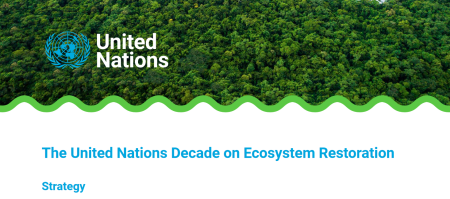
Resource description:
The 2030 Agenda for Sustainable Development seeks to end poverty, conserve biodiversity, combat climate change and improve livelihoods for everyone, everywhere. These objectives, encapsulated in 17 Sustainable Development Goals (SDGs) are unlikely to be met unless ecosystem degradation is stopped and ecosystem restoration is undertaken at the immense scale of hundreds of millions of hectares globally. Currently, there is insufficient political support and technical capacity in both the public and private sectors to invest in the many hundreds of thousands of ecosystem restoration initiatives worldwide that are needed to achieve restoration at such a scale. Not only would such investment contribute to achieving the SDGs, but it would also yield considerable economic returns for a recovery from the COVID-19 crisis and lead to more social, economic and ecological
resilience. Based on data from a wide range of ecosystems, for every dollar spent on restoration, between three and seventy-five dollars of economic benefits from ecosystem goods and services can be expected. UN Member States decided to implement a Decade on Ecosystem Restoration to realise these benefits and to ensure that healthy ecosystems play a critical role towards achieving the SDGs by 2030. This UN Decade will inspire and support governments, UN agencies, NGOs, civil society, children and youth, private sector companies, indigenous peoples, farmers, women’s groups, local communities and individuals globally to collaborate and develop the appropriate skillsets for catalysing and successfully implementing restoration initiatives across the world. The support will include: promoting a global movement focussing on restoration; developing legislative
and policy frameworks to incentivise restoration; developing innovative financing mechanisms to fund operations on the ground; detailing a values-based imperative to conserve, restore and care for nature; undertaking social and natural science research on restoration in terrestrial, freshwater, estuarine as well as marine environments; monitoring global progress on restoration; and building the technical capacity of restoration practitioners globally. Although the UN Decade ends in 2030, it aims to create a platform for societies globally to put their relationships with nature on a new trajectory for centuries to come. It is envisaged that this trajectory will include: nature being respected across society; ecosystem restoration taking place over hundreds of millions of hectares and generating millions of new livelihoods; human rights, with a focus on gender equity, youth, local communities,
indigenous peoples and future generations, being central to restoration initiatives; global supply chains and consumption patterns being shifted to protect, sustainably manage and restore nature; long-term scientific research being used to guide restoration initiatives; and the value of nature being a central pillar of national systems that assess economic well-being.
Author/Contact:
United Nations
Licence:
- Free, no licence